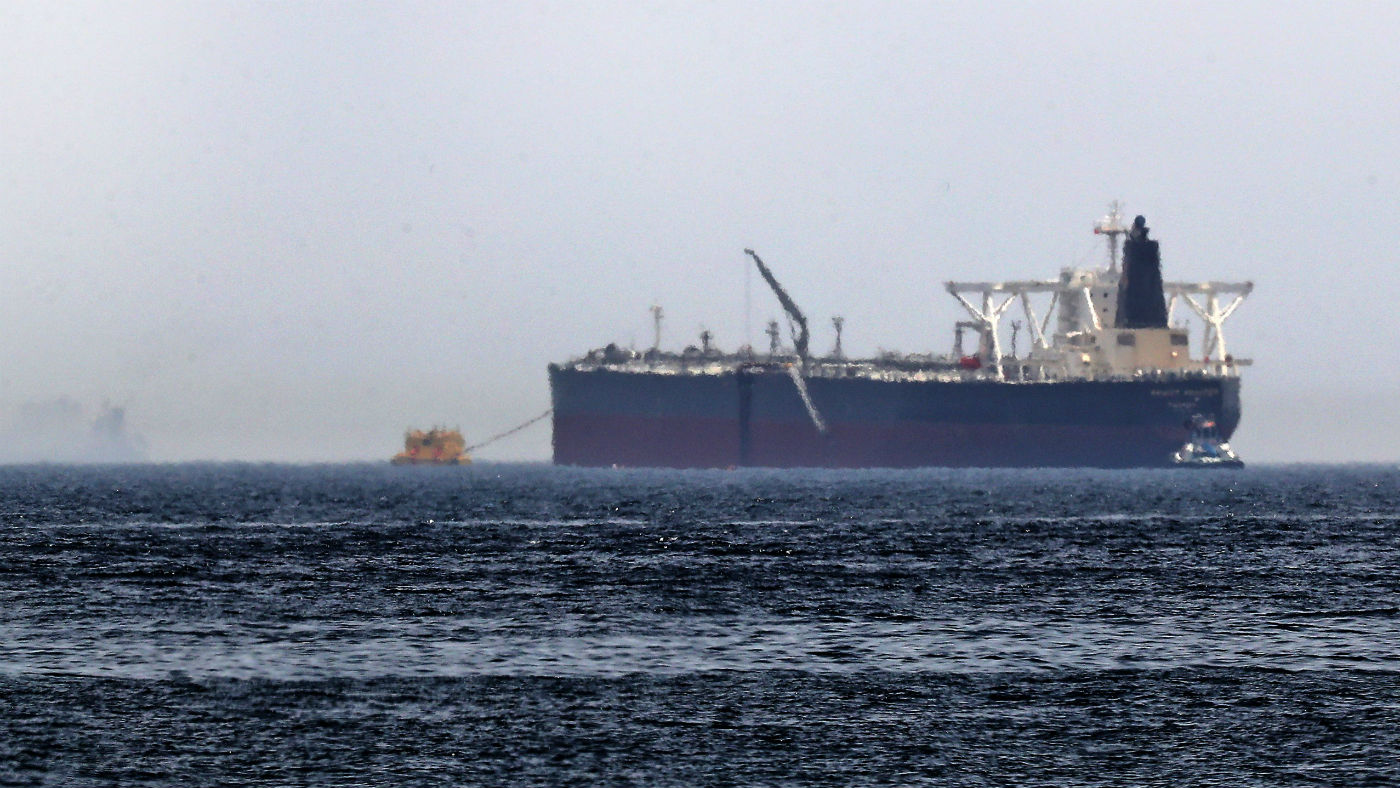Who is attacking Gulf oil tankers?
Tension at the world’s oil choke point could be the match that sets the Middle East alight

A free daily email with the biggest news stories of the day – and the best features from TheWeek.com
You are now subscribed
Your newsletter sign-up was successful
An international investigation into attacks on oil tankers off the coast of the United Arab Emirates last month has concluded that a “state actor” is the most likely culprit.
The UAE, Saudi Arabia and Norway told the United Nations Security Council there are “strong indications that the four attacks were part of a sophisticated and coordinated operation carried out with significant operational capacity”.
Of the commercial ships targeted in the blasts, on 12 May, “one was flying a UAE flag, two were tankers owned by Saudi Arabia, and the fourth was a Norwegian tanker”, reports CNN.
The Week
Escape your echo chamber. Get the facts behind the news, plus analysis from multiple perspectives.

Sign up for The Week's Free Newsletters
From our morning news briefing to a weekly Good News Newsletter, get the best of The Week delivered directly to your inbox.
From our morning news briefing to a weekly Good News Newsletter, get the best of The Week delivered directly to your inbox.
Both the US and Saudi Arabia have pointed the finger at Iran, but the investigation report does not identify any state as the alleged aggressor.
Tehran has denounced the attack and denied involvement. A senior Iranian lawmaker told Reuters that “saboteurs from a third country” could be behind the sabotage and that the incident showed the security of Gulf states was fragile.
According to the newly released investigation report, the attacks on the vessels, in UAE territorial waters 12 nautical miles off the emirate of Fujairah, required a “high degree of coordination” and advanced technical and intelligence capabilities.
Divers are believed to have attached limpet mines that blew up the tankers in an assault intended to “incapacitate the ships without sinking them or detonating their cargoes”, the report says.
A free daily email with the biggest news stories of the day – and the best features from TheWeek.com
There were no casualties, but Saudi Arabia says that two of its ships suffered "significant" damage.
As The Times notes, attacks on maritime traffic in the Gulf “have fuelled tensions already heightened by the unravelling Iran nuclear deal and Washington’s moves beefing up its military presence in the region, citing unspecified threats from Iran”.
US national security adviser John Bolton has warned of a “very strong response from the US” against the Islamic republic and its proxies in the event of further attacks in the Persian Gulf.
Although “it is unclear why Iran would carry out a relatively low-level attack on the multinational tankers”, observers have speculated that “it could have been to send a signal to forces ranged against it that it is capable of disrupting shipping there without triggering a war”, says the BBC.
Oil prices rose by nearly 2% immediately after the attack, amid fears that the vital choke point for the world’s oil supply could provide the match that sets the region alight.
In April, Iran’s Revolutionary Guard threatened to “close” the Strait of Hormuz, through which about a fifth of the world’s oil supply passes, if it was prevented from using the waterway. Days later, relations between the US and Iran hit a new low when Tehran passed a new law declaring any US troops stationed in the Middle East “terrorists”.
The US Maritime Administration then issued an advisory warning that “Iran or its proxies” could be targeting commercial vessels and oil production infrastructure in the region.
The US “has bolstered its military presence in the Gulf with additional troops, bombers and an aircraft carrier group”, reports the Financial Times. The heightened deployment is intended to deter further incidents, US officials have said.
-
 6 of the world’s most accessible destinations
6 of the world’s most accessible destinationsThe Week Recommends Experience all of Berlin, Singapore and Sydney
-
 How the FCC’s ‘equal time’ rule works
How the FCC’s ‘equal time’ rule worksIn the Spotlight The law is at the heart of the Colbert-CBS conflict
-
 What is the endgame in the DHS shutdown?
What is the endgame in the DHS shutdown?Today’s Big Question Democrats want to rein in ICE’s immigration crackdown
-
 Will increasing tensions with Iran boil over into war?
Will increasing tensions with Iran boil over into war?Today’s Big Question President Donald Trump has recently been threatening the country
-
 Epstein files topple law CEO, roil UK government
Epstein files topple law CEO, roil UK governmentSpeed Read Peter Mandelson, Britain’s former ambassador to the US, is caught up in the scandal
-
 Iran and US prepare to meet after skirmishes
Iran and US prepare to meet after skirmishesSpeed Read The incident comes amid heightened tensions in the Middle East
-
 Which way will Trump go on Iran?
Which way will Trump go on Iran?Today’s Big Question Diplomatic talks set to be held in Turkey on Friday, but failure to reach an agreement could have ‘terrible’ global ramifications
-
 Israel retrieves final hostage’s body from Gaza
Israel retrieves final hostage’s body from GazaSpeed Read The 24-year-old police officer was killed during the initial Hamas attack
-
 China’s Xi targets top general in growing purge
China’s Xi targets top general in growing purgeSpeed Read Zhang Youxia is being investigated over ‘grave violations’ of the law
-
 Panama and Canada are negotiating over a crucial copper mine
Panama and Canada are negotiating over a crucial copper mineIn the Spotlight Panama is set to make a final decision on the mine this summer
-
 Iran unleashes carnage on its own people
Iran unleashes carnage on its own peopleFeature Demonstrations began in late December as an economic protest